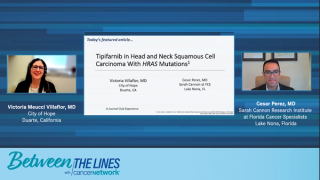
Head & Neck Cancer
Latest News
Latest Videos

CME Content
More News

Data support cetuximab/radiotherapy as a suitable option in carefully selected patients with HPV-negative squamous cell carcinoma of the head and neck.

The phase 3 NIVOPOSTOP GORTEC 2018-01 trial shows that nivolumab added to radiotherapy and cisplatin had improved efficacy over SOC treatments in SCCHN.

Experimental regimens did not cross the threshold to show superiority vs standard cisplatin plus 70 Gy radiation in those with HPV-associated oropharynx cancer.

Phase 2 data may support petosemtamab as a best-in-class treatment for frontline HNSCC, according to Jérôme Fayette, MD.

Phase 2 data also highlight an improvement in disease control rate with setanaxib/pembrolizumab in squamous cell carcinoma of the head and neck.

Nurses must increase the frequency of their assessments for early intervention of patients who undergo treatment for their head and neck cancer, in an effort to truly individualized care.

LYT-200 is currently being investigated for those with solid tumors and hematologic malignancies.

Patients with factors such as lymphovascular space invasion or positive glossectomy specimen margins may be considered for adjuvant radiotherapy to optimize disease control of tongue squamous cell carcinoma.

The use of postoperative adjuvant radiation therapy led to less weight loss in patients with HPV-positive oropharynx cancer, according to Wade L. Thorstad, MD.

Frontline pembrolizumab with or without chemotherapy appears to remain a standard of care for patients with recurrent or metastatic head and neck squamous cell carcinoma based on data from the LEAP-010 study.

Treatment with toripalimab does not yield the same vascular toxicity seen with pembrolizumab in patients with advanced or metastatic nasopharyngeal carcinoma, according to Barbara Burtness, MD.

The FDA grants clearance to an oral immobilization stent designed to redirect radiation to the target tumor area for patients with head and neck cancer.

Overall survival also appears to improve with toripalimab compared with chemotherapy among patients with metastatic or advanced nasopharyngeal carcinoma.

Study shows a high prevalence of thyroid cancer in transgender female patients.

Data from the phase 3 JUPITER-02 study and phase 2 POLARIS-02 study support the FDA approval of toripalimab-tpzi alone and in combination with gemcitabine and cisplatin in nasopharyngeal carcinoma.

Findings from a phase 2 trial also show that there is no progression-free survival or overall survival benefit with lapatinib plus chemoradiotherapy in patients with non-human papillomavirus–related head and neck cancer.

A yoga intervention program in patients with head and neck cancer appears to correlate with significantly fewer feeding tube placements compared with those receiving usual care.

Sacituzumab govitecan showed anti-tumor activity in patients with pretreated metastatic or locally recurrent head and neck squamous cell carcinoma.

Investigators will assess the safety and pharmacodynamics of ALE.C04 in patients with CLDN1-positive head and neck squamous cell carcinoma as part of a phase 1/2 clinical trial.

The FDA requires data from an additional clinical trial to support the potential approval of avasopasem for managing radiation-induced severe oral mucositis in patients with head and neck cancer.

How treatment paradigms regarding HPV-positive squamous cell carcinoma will evolve, particularly in the era of precision medicine, is a provocative question and is the subject of this review.

Sintilimab plus chemoradiotherapy produces a higher 3-year distant metastasis-free survival rate vs chemoradiotherapy alone among patients with advanced nasopharyngeal carcinoma in the phase 3 CONTINUUM trial.

Treatment with eftilagimod alpha in combination with pembrolizumab appears safe and well tolerated among patients with metastatic head and neck squamous cell carcinoma in the phase 2 TACTI-002 study.

With no standard treatment available, darolutamide shows potential activity among patients with androgen receptor–positive salivary gland cancer in the phase 2 DISCOVARY trial.

Investigators say that among those with platinum-refractory recurrent or metastatic head and neck squamous cell carcinoma who responded to nivolumab plus ipilimumab duration of response was not reached.







































